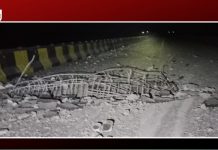Note: The book The Baloch Cultural Heritage authored by renowned intellectual and author of many books, Jan Mahmmad Dashti, is considered one of the most ‘valuable contribution towards understanding the Baloch traditions in their proper historical perspective’.
The first edition of this book was published in 1982, therefore, the book is not readily available in this modern arena of search engines. The Balochistan Post (TBP) believes unavailability of such books is an injustice to students of anthropology and the Baloch youth. TBP will convert the book and publish it in parts for wider reading.
The Baloch Cultural Heritage
Author: Janmahmad
Part – 1
Dedicated to Baloch Youth
Acknowledgements
I would like to acknowledge my indebtedness to many friends who helped me in writing this book. I received most valuable and cordial assistance from Mr. Muneer Baloch who helped me in making notes during the period of research. He typed the first draft of my almost illegible handwriting and also typed the final draft. Without his cooperation I might not have been able to present this small volume without a delay of many months. I am thankful to Mir Surat Xan Mari for some very useful suggestions ; quite a few of these are included in the book.
Foreword
No culture could achieve any compactness without continuity. The continuity which may be geographical or religious can hardly imply any cultural homogeneity unless a people attain a life-pattern inspired by the fundamental values and depicted through its social and political institutions. Any term thus connoting territorial or religious like the Asian, Muslim or Christian culture, would be a misnomer. The factors of cultural coherence are common history and traditions which invariably produce a common outlook. In other words, a collective will be generated by common traditions and past glory would not only unite a people and give a meaning to their culture but also guarantee its vitality and strength. The culture remains vigorous and forceful as long as the people find some real fulfilment by living up to the common values, which are never automatically adopted as legacy. Every generation must recapture them afresh in view of their usefulness.
This book is a modest effort to discuss the conditions which have ensured the continuity of the Baloch culture, and also the inspiring characteristics which still direct the Baloch society.
Written source material on Baloch history and culture is almost scarce, save some faint references in a few ancient documents which require a very cautious and scientific analysis for arriving at proper conclusions. Tremendous efforts are needed to separate facts from fiction and distortions of the modern writers on the Baloch. One of somewhat reliable source could be the Baloch traditions preserved mostly in classical poetry and folk literature. There also one has to proceed with extra care to avoid the later bardic additions to almost every poem.
The Balochi poetry has undergone virtually many changes according to requirements of time. We find in the so-called poem of genealogy that Rind, a Baloch tribe, migrated from Allepo, Syria, after the martyrdom of Hussain, grandson of Prophet Mohammad. There is also a poem indicating that Baloch were Shia, one of the various sects of Islam. Both these poems are far from truth. Rind suzerainty in easter Balochistan for a few decades led to general desire of every Baloch or indigenous non-Baloch tribe to associate itself with Rind or claim to be originally Rind. One of the famous Baloch tribes, Lashar, after their defeat and migration had got some later bardic contempts, and their elders were ridiculed in order to flatter the Rind and their allies. Some tribes who did not even exist at that period were later mentioned in the poems as participating in Rind-Lashar wars. There is an interesting poem on the Battle of Gokpros, in which Mir Baloxh Xan was killed with scores of others. Mehrab Xan, the Gichki sovereign of Kech, who fled from the battlefield with his entire Lashkar without a fight has widely been praised for what the poet says his bravery and extreme courage. ‘He was the only Chief through Balochistan, from Bela to Kalat, who decided to fight the British,’ the poem narrates. There is an obvious reason for that. Since Mehrab Xan remained the Kech ruler after evolving an understanding with alien masters, no one dared compose a derogatory poem taunting him for his cowardliness and treachery. similarly, Chakar’s journey to Hirat to seek help against Lashar; coming out of seemingly impossible tests of bravery like killing of an elephant, or riding an untamed horse; Hammal, fighting a lion or Beebgr kidnapping the daughter of the ‘King of Kandahar’, are merely fictitious or grossly exaggerated stories.
There is a very little evidence to prove such bardic assertions. Therefore, every notion based only on poetic traditions has been checked with available historical records and general geo-political, religious and cultural history of the Baloch as well as the cultural traits of the entire people of this region. As regards folk literature, one has also great difficulty in separating foreign influences from original Balochi folks. I have endeavoured to keep all these factors in view while depending on poetry and folk literature in arriving at conclusions regarding Baloch history and culture.
It may also be pointed out that this book is by no means an attempt to produce a systematic history of the Baloch people. It depicts their culture and traditions. The first chapter which deals briefly with their history and racial origin has been included merely as an introductory part for facilitating the reader in the understanding of the Baloch cultural characteristics in their correct historical perspective.
Balochi poems, proverbs, maxims etc. have been quoted in footnotes as the sources of assertion as well as further guide to the readers of Balochi literature.
Translations of poetry was the most irksome, because translation of a good poem is always difficult in another language. This is due to the fact that the poet always contrives to express exactly what he wants to communicate by employing all the resources of the language, matching the words and phrases and putting them in beautifully constructed rhythmical order. Special efforts have, however, been made to produce a proper rendering of Balochi poems quoted.
Janmahmad
Quetta
December 3, 1981.
[to be continued]
Disclaimer: The views and opinions expressed in this article are those of the author and do not necessarily reflect the official policy or position of The Balochistan Post or any of its editors.





























